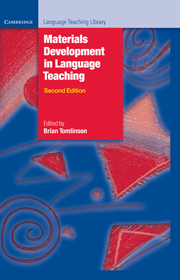Book contents
- Frontmatter
- Contents
- Preface
- Glossary of basic terms for materials development in language teaching
- Acknowledgements
- 1 Introduction: principles and procedures of materials development
- Part A Data collection and materials development
- 2 Using corpora in the language classroom
- 3 Concordances in the classroom without a computer: assembling and exploiting concordances of common words
- 4 Telling tails: grammar, the spoken language and materials development
- Comments on Part A
- Part B The process of materials writing
- 5 A framework for materials writing
- 6 Writing course materials for the world: a great compromise
- 7 How writers write: testimony from authors
- Comments on Part B
- Part C The process of materials evaluation
- 8 The analysis of language teaching materials: inside the Trojan Horse
- 9 Macro- and micro-evaluations of task-based teaching
- 10 What do teachers really want from coursebooks?
- 11 The process of evaluation: a publisher’s view
- Comments on Part C
- Part D The electronic delivery of materials
- 12 Developing language-learning materials with technology
- 13 New technologies to support language learning
- Comments on Part D
- Part E Ideas for materials development
- 14 Seeing what they mean: helping L2 readers to visualise
- 15 Squaring the circle – reconciling materials as constraint with materials as empowerment
- 16 Lozanov and the teaching text
- 17 Access-self materials
- Comments on Part E
- Conclusions
- Recommended reading
- Index
6 - Writing course materials for the world: a great compromise
Published online by Cambridge University Press: 09 February 2023
- Frontmatter
- Contents
- Preface
- Glossary of basic terms for materials development in language teaching
- Acknowledgements
- 1 Introduction: principles and procedures of materials development
- Part A Data collection and materials development
- 2 Using corpora in the language classroom
- 3 Concordances in the classroom without a computer: assembling and exploiting concordances of common words
- 4 Telling tails: grammar, the spoken language and materials development
- Comments on Part A
- Part B The process of materials writing
- 5 A framework for materials writing
- 6 Writing course materials for the world: a great compromise
- 7 How writers write: testimony from authors
- Comments on Part B
- Part C The process of materials evaluation
- 8 The analysis of language teaching materials: inside the Trojan Horse
- 9 Macro- and micro-evaluations of task-based teaching
- 10 What do teachers really want from coursebooks?
- 11 The process of evaluation: a publisher’s view
- Comments on Part C
- Part D The electronic delivery of materials
- 12 Developing language-learning materials with technology
- 13 New technologies to support language learning
- Comments on Part D
- Part E Ideas for materials development
- 14 Seeing what they mean: helping L2 readers to visualise
- 15 Squaring the circle – reconciling materials as constraint with materials as empowerment
- 16 Lozanov and the teaching text
- 17 Access-self materials
- Comments on Part E
- Conclusions
- Recommended reading
- Index
Summary
Introduction
Coursebook writers may set out to write materials they would want to use themselves if they were teaching in a particular situation, but their role has to be to collaborate in the publication of materials for others. They need to cater for a wide range of students, teachers and classroom contexts with which they have no personal acquaintance, even though they might be familiar with the general pedagogic situation for which the material is intended.
Writers have to try to anticipate the needs and interests of teachers and students and to modify any initial ideas they may have as a result of what they continue to learn about those needs and interests. The focus of this chapter is on that process of modification and whether the inevitability of compromise is a positive or negative force upon the writers’ pedagogic principles. We will use our own experience to illustrate, and assume that readers will, despite our conclusions, make up their own minds.
Coursebooks in general: confronting the issues
For some years now there has been debate about the desirability of using coursebooks – indeed many of the issues have been raised by authors in this book. The debate has tended to be polarised between those who object to coursebooks in principle, whether they see them as instruments of institutional control supported by a range of commercial interests or as implicitly prescriptive and destroyers of teacher and learner creativity, and those who argue that coursebooks provide teachers and learners with a range of professionally developed materials within tried-and-tested syllabus structures, thereby allowing teachers to spend their valuable time more on facilitating learning than materials production. The arguments in favour of coursebooks are often made by those with vested interests – writers, publishers and distributors – and are therefore open to the accusation of special pleading. Their cause is not helped by the too-frequent adoption of coursebooks in situations for which they were not originally intended – for example, adult/young adult global coursebooks in a lower secondary school or even in junior summer schools in the UK. This is often because of misguided management, but it is too frequently encouraged by marketing teams and distributors who want to make sure their products get into as many schools as possible, no matter how suitable they are for the context.
- Type
- Chapter
- Information
- Materials Development in Language Teaching , pp. 135 - 150Publisher: Cambridge University PressPrint publication year: 2011
- 24
- Cited by



